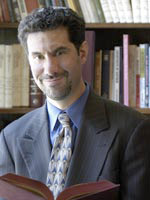
Our tradition teaches that Yom Kippur, the Day of Atonement, is not the only day to atone. Rather, the need to atone is a constant one.
During the Hebrew month of Sh'vat, when our Torah readings include the plagues upon Egypt, the parting of the Red Sea, and the giving of the Ten Commandments, we are reminded that the same Creator who suspends the rules of nature on Israel’s behalf calls upon on to keep a sacred covenant for all time.
Ashamanu, we confess, O God and God of our ancestors, that our lack of environmental responsibility is among our most serious of sins. How can we proudly count the Ten Commandments as among our greatest gifts to civilization while we contradict each one in the ways we mistreat the world you gave us to protect?
Environmental failure returns redemption from Egypt with the ingratitude of greed.
It is a form of idolatry, for it misdirects our ultimate loyalty to undeserving entities.
It undermines the Sabbath by continuing to misuse creation while singing praises of the Creator.
It compromises the commandment to honor mother and father because they raised us to appreciate nature, taught us to respect it, and expect us to preserve it. We cannot fully revere them if we chose not to remember what they taught us.
Even in the absence of malice, our environmental failure is a kind of killing. It is a variant of manslaughter, negligent and reckless; it shortens and endangers lives that we ought to protect.
It is akin to adultery, for it represents a broken vow and betrayal of trust.
It is a form of theft, for it deprives others of what is rightfully theirs.
It is a form of bearing false witness, for it requires obscuring the truth to the detriment of our neighbors.
And it is a form of coveting because it exemplifies ruminating on gain instead of scrutinizing our desires.
Full of regret and remorse, we confess this ten-fold sin.
Confessing sin, however, is no more and no less than a beginning. Addressing sin is a far more demanding undertaking requiring a change of behavior. Confessing a sin takes seconds; addressing repeated and severe sin takes a lifetime. Confessing a sin is to acknowledge wrongdoing; addressing a sin means acting on that acknowledgement.
Like racism, sexism, homophobia, greed, apathy, complicity, and complacency in the face of poverty, violence, and oppression; addressing our moral failure on the environment is more than a question of tikkun olam, repairing the world. It is an obligation arising from t’shuvah, the work of repentance. Tikkun olam is grounded in the responsibility to do what is right. T’shuvah is rooted in the responsibility of righting what is wrong.
Environmental repentance requires more than confessing the manifold abuses caused by pollution, it calls us to confront them.
May this month, filled with powerful Torah passages about what we, the created, owe the Creator, make us more mindful of our duty to protect and preserve the planet entrusted to our care.
For environmental actions you can take, visit such organizations as the Coalition on the Environment and Jewish Life (COJEL), the Religious Action Center of Reform Judaism (RAC,) the Sunrise Movement, the Sierra Club, and more.
For more information on the Reform Jewish community’s environmental work, visit http://www.rac.org/enviro.
Rabbi David Wirtschafter is the rabbi of Temple Adath Israel in Lexington, KY. Confronting violence in classic Jewish texts and contemporary society is the focus of his work in progress, The Torah They Never Taught You, Bad Stories from The Good Book.

